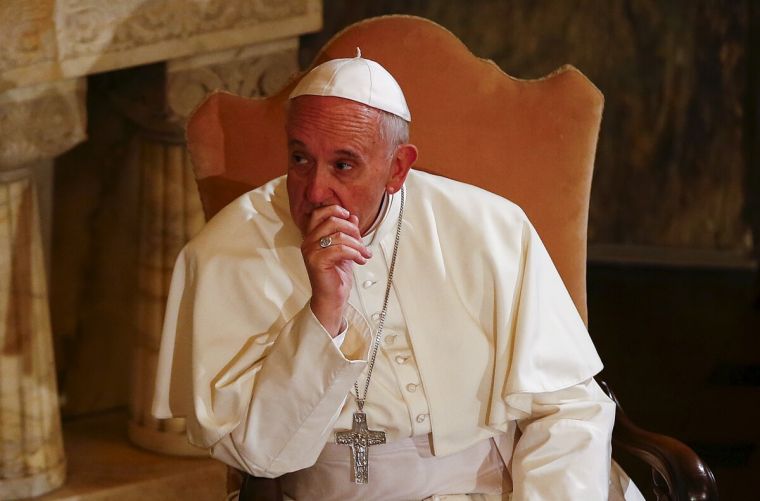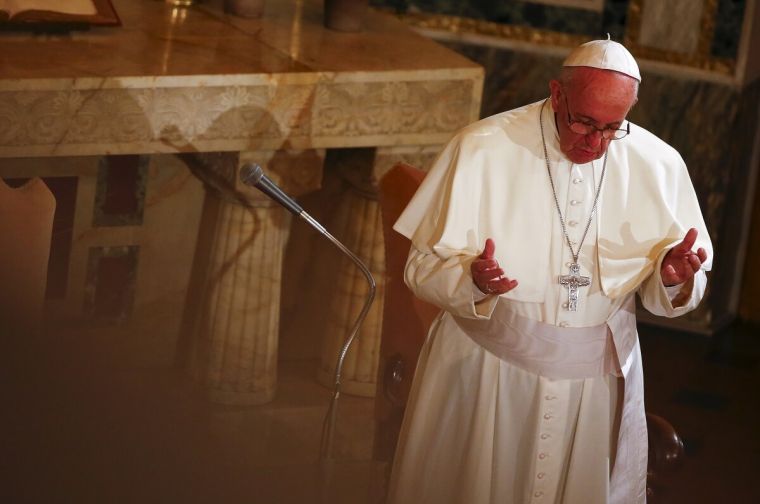Pope tells non-Catholic woman to decide for herself over receiving communion
Pope Francis has apparently challenged centuries of Catholic doctrine by advising a Lutheran woman to talk to God and then decide for herself whether she should receive Communion when at Mass with her Catholic husband.
The subject of intercommunion is hugely controversial. Catholic doctrine has, especially since the Reformation, been clear that non-Catholics cannot receive the sacrament of Holy Communion.
Even former Prime Minister Tony Blair became caught up in the debate before he converted to Catholicism, when there was speculation over whether or not he received the sacrament when attending Mass with his wife Cherie Blair, a Catholic.
The subject has come into focus again because of the debate over the ban on communion for Catholic divorcees who have had a civil remarriage without an annulment.
Pope Francis was speaking in a question and answer session before vespers during a visit to Christuskirche, the Evangelical Lutheran church in Rome.

Anke de Bernardinis, a member of the congregation, asked the Pope about receiving communion alongside her Italian husband. He replied that she should "talk to the Lord" and "then go forward". He did say he "wouldn't ever dare to allow this, because it's not my competence." But he also said: "I ask myself: don't we have the same Baptism? If we have the same Baptism, shouldn't we be walking together?"
The Catechism of the Catholic Church states churches that are derived from the Reformation and are separated from the Catholic Church "have not preserved the proper reality of the Eucharistic mystery in its fullness, especially because of the absence of the sacrament of Holy Orders." Therefore Eucharistic intercommunion with them "is not possible."
According to a translation by Rome correspondent Edward Pentin, Pope Francis told the Lutherans: "The question on sharing the Lord's Supper isn't easy for me to respond to, above all in front of a theologian like Cardinal Kasper! I'm scared! I think of how the Lord told us when he gave us this command to 'do this in memory of me', and when we share the Lord's Supper, we recall and we imitate the same as the Lord. And there will be the Lord's Supper, there will be the eternal banquet in the new Jerusalem, but that will be the last one. In the meantime, I ask myself — and don't know how to respond — what you're asking me, I ask myself the question. To share the Lord's banquet: is it the goal of the path or is it the viaticum for walking together? I leave that question to the theologians and those who understand.
"It's true that in a certain sense, to share means there aren't differences between us, that we have the same doctrine – underscoring that word, a difficult word to understand — but I ask myself: but don't we have the same Baptism? If we have the same Baptism, shouldn't we be walking together? You're a witness also of a profound journey, a journey of marriage: a journey really of the family and human love and of a shared faith, no? We have the same Baptism."

In his homily after Vespers, the Pope said Catholics and Lutherans must offer each other forgiveness for past conflicts. He also said joining in prayer and liturgy can bring Christians closer together.
The pastor, Rev Jeans-Martin Kruse, said this was the third appearance by a Pope. John Paul II visited in 1983, the 500th anniversary of the birth of Martin Luther, and Pope Benedict XVI visited in 2010.











